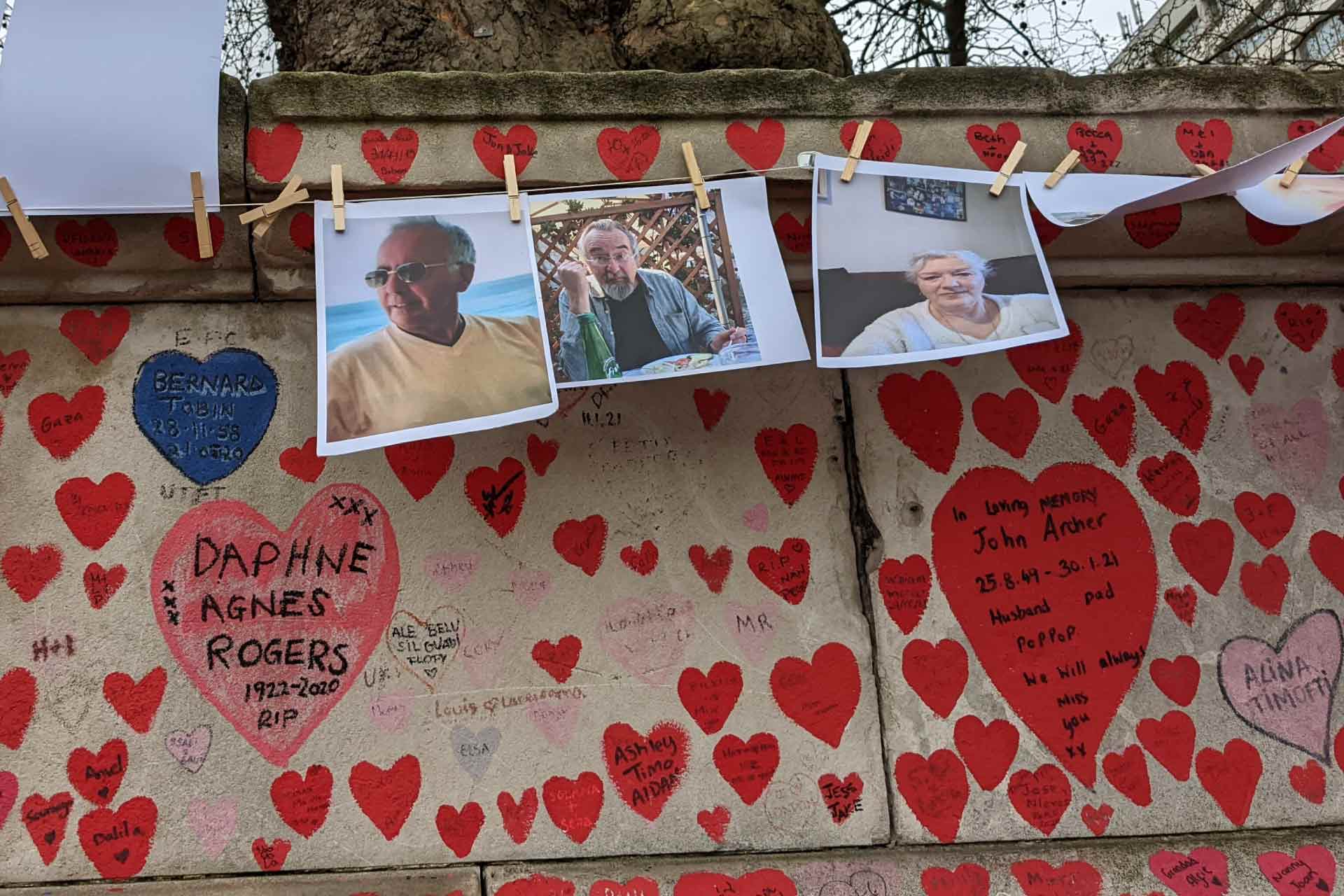
A Management School’s report on the ‘Lived Experiences of People Bereaved by COVID-19’ urges the UK Government to make the voices of people who lost loved ones in the pandemic an integral part of the UK COVID-19 Public Inquiry.
Research by Professor Lynn Sudbury-Riley assesses the lived experiences of the pandemic on those left behind in their quest for clarity and transparency in the public inquiry.
Families who lost loved ones during the pandemic have been at the forefront of the search for answers over the UK Government’s handling of the pandemic, with the resulting report adding their voice in support of the search for truth.
This is a death, that unless you’ve experienced it, it’s like no other death
Amy, relative bereaved by COVID-19 and study participant
According to Lynn, the study “spotlights the lived experiences of the implications of these failings, the consequences of a wide range of further weaknesses in systems and processes, and the ongoing repercussions of being bereaved by COVID-19”.
Lynn’s work focuses on listening to the arduous and unprecedented bereavement experiences of those who lost relatives during lockdown, and hearing the voices of those struggling in a post-pandemic environment.
Alongside providing a series of recommendations for the Government to take on board, the document is part of a wider demand for the opinions of bereaved relatives to become a crucial part of public inquiries.
The report has been endorsed by the COVID-19 Bereaved Families for Justice (CBFJ) group, and has contributed to the Terms of Reference for the Statutory Public Inquiry, as well as being used as part of the Hillsborough Law Now Campaign.
A death like no other
The UK COVID-19 Public Inquiry’s key objective is to examine ‘the UK’s reaction to and impact of the COVID-19 pandemic and learn lessons for the future’, with further research on a wide range of issues highlighted by the state’s pandemic response.
However, a window into the reality of how families are coping after losing a family member shows how the previous Health and Social Care and Science and Technology Committee report, failed to consult with the individuals most affected by death during the pandemic.
Despite early assurances of the Inquiry focusing on the experiences of those bereaved by COVID-19, many bereaved felt they were again being pushed aside.
Following an analysis of pathographies (stories of illness experiences) from 28 people, who lost 30 relatives to COVID-19, Lynn found substantial differences in grieving experiences compared to a pre-pandemic scenario.
The narratives highlight recurrent issues, from a lack of prompt and sufficient system responses, to the impact of restrictions, which triggered traumatic experiences during the mourning process:
Slow responses
Slow Responses by many people in authority (including GPs, NHS 111, and the ambulance service) caused delays in diagnosis, as did confusion around systems, processes and communications.
Being unable to accompany relatives
Being unable to accompany relatives to hospital even when they were considered extremely vulnerable, were particular sources of anguish for families.
Poor communication
Poor communication is a constant theme, with narratives referring to extremely long periods of time (exceeding 24 hours in some cases) between a patient being admitted and the family receiving any communication about them.
These communication delays continue throughout the whole period in which patients are in hospital, and tales of desperation in trying to ring general wards for news are commonplace.
The importance of digital communications channels to keep in contact with loved ones emerged as extremely important for many.
There were, however, vulnerable patients who needed assistance with technology.
Stories of kindness from individual healthcare staff emerged, where staff tried to help patients and families communicate.
However, others often did not receive any help and therefore direct communications between families were cut.
A system in chaos
A system in chaos is apparent in many stories.
Tales of conflicting information, incorrect information and an overstretched system that at times was unable to cope are interwoven among so many narratives that it would be impossible to suggest anything but chaos and crisis.
Do-Not-Resuscitate (DNR) and critical care decisions
Do-Not-Resuscitate (DNR) and Critical Care Decisions have become an increasingly controversial issue both in the UK and internationally during the pandemic.
Narratives tell of a lack of explanation or consultation with families regarding DNR orders, changed DNR decisions when COVID-19 was diagnosed, and the seemingly ad hoc ways in which critical care decisions were made.
Feelings of helplessness and powerlessness
Feelings of helplessness and powerlessness experienced due to a lack of information, DNR decisions, frustrating systems, and being unable to visit or even communicate with loved ones, particularly at end of life, were major causes of families feeling totally helpless.
Perceptions of a striking power imbalance emerged between the all-powerful system and the completely helpless patient and their family.
COVID-19 deaths are different
COVID-19 Deaths are Different in many ways, and death in a pandemic brings particular issues that are absent during ‘normal times’.
Visiting restrictions mean people were forced to say goodbye via video or telephone and many patients died without their families being with them, with many feeling a COVID-19 death was not dignified.
Lockdown and social distancing regulations caused issues with the practicalities of registering a death and the official business that has to be completed.
Attitudes among COVID-19 deniers make many bereaved families feel worse.
The fact that the pandemic permeates every aspect of life, together with a sense of collective grief, makes bereavement more difficult too.
Rituals and mourning practices
Rituals and mourning practices, which serve to facilitate the grieving process and support the healing process, were restricted or denied due to the pandemic.
Being unable to view or dress the body, have funeral cars, or touch and carry the coffin caused extra sorrow.
Severe restrictions on the numbers attending funerals, being unable to hold a wake, and social isolation when newly bereaved added to the difficulties associated with grief.
Inadequate and insufficient counselling and mental health support
Inadequate and insufficient counselling and mental health support services became apparent. Long waiting lists and distressing stories about grief impacting wellbeing are commonplace.
Anger and blame
Anger and blame are clear throughout many narratives.
Some of this is directed at NHS policies and practices, though many families were keen to stress they do not blame the hospital frontline staff.
Overwhelming anger is directed at Government decisions.
The Public Inquiry
The Public Inquiry is incredibly important to the bereaved.
Families want transparency, the truth, full disclosure, and public awareness., however, many are sceptic and concerned (the Hillsborough Inquiry was mentioned several times).
These people want change, so that in the future no one else has to endure the lived experiences of these families.
Professor Sudbury-Riley, who lost her father during the pandemic, added: “Being bereaved during a pandemic is very, very different to being bereaved at other times, and that is because of the total absence of contact with loved ones.
“That’s not just contact with the person that was sick, and who was dying, it’s contact with the person once they were deceased, and contact with family and friends during the grieving process.
“There was a denial of what we call death and mourning rituals and they are so, so important for bereaved people.”
Alongside support from the CBFJ, Lynn worked alongside the group to record an emotional video titled ‘A Death Like No Other’, and she received the ‘Best First Time Filmmaker’ award at the Association for Consumer Research Conference (Seattle) in autum 2023 for her work on the film.
CBFJ spokesperson Fran Hall, who appears in the video, added to the feeling of upset at a lack of bereavement support: “The people most affected are those who have lost someone to COVID-19.
“Lynn’s research is about the lived experience of losing somebody, and what it was like to see them become ill, and then disappear – either to die – or be taken to hospital and not see them again.”
These emotional stories form a wider picture of thousands of families grieving the death of loved ones and frustrated by a lack of information over pandemic planning.
Giving a voice to bereaved families
Lynn’s report was presented as evidence to Government Ministers in 2022, leading to questions in the House of Commons.
Since then, the document has contributed to the Terms of Reference for the Statutory Public Inquiry, and has informed the All-Party Parliamentary Group’s Hospice and End of Life Care’s review on 'The Lasting Impact of COVID-19 on Death, Dying and Bereavement'.
The report urges the Government to consider a series of recommendations during the inquiry process and its future pandemic planning:
- Improved pandemic planning across Government, NHS and social care
- Investigation into NHS systems and processes during the pandemic
- Overhaul of communication practices between hospitals and families
- Development of specialist bereavement and counselling services
- A focus on the implications of denying cultural death rituals
- System changes to reduce infections within healthcare settings
- Increase training in end-of-life care for frontline staff
- Overhaul of processes for ‘Do Not Resuscitate’ and critical care decisions
- Provision of permanent memorials to COVID-19 victims
- Public Inquiry is brought forward and conducted with diligence and integrity
The report’s co-author, Dr Benito Giordano, who lost both his parents to COVID-19, said: “Transparency, the truth, and public awareness emerge as incredibly important to bereaved families.
“Many want senior people held to account but, most of all, these people want change, so that in the future no one else has to endure the lived experiences of these families.”
Read more and download Lynn's report here
“COVID19 bereaved families are terrified to become the next Hillsborough families”
Alongside its impact on the COVID-19 inquiry process, the research has also been used as part of the Hillsborough Law Now Campaign, a coalition which brings together a variety of groups striving for justice.
During the Labour Party Conference held in Liverpool in September 2022, Lynn was invited to the Hillsborough Law Now Coalition rally, to speak on behalf of the CBFJ group, and she explained how COVID-19 bereaved relatives fear becoming the next Hillsborough families.
Live from the Hillsborough rally at Labour conference as Labour pledges 'Hillsborough Law.' https://t.co/Pgn00Wtiht
— The Mirror (@DailyMirror) September 26, 2022
This is part of a wider campaign led by Labour, for the approval of ‘The Public Advocate and Accountability Bill’ (also known as ‘The Hillsborough Law’), which seeks to create a new legal duty of candour on public authorities to prevent future cover-ups.
The proposed bill also demands a new framework to ensure victims of disasters or state-related deaths are entitled to parity of legal representation during inquests and inquiries.
 |
Chair in Marketing and Director of Education of the Marketing Subject Group
|